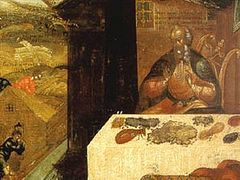 Christ and the Rich Young Ruler. Artist: Heinrich Hofmann
Christ and the Rich Young Ruler. Artist: Heinrich Hofmann
Today’s Gospel at the Divine Liturgy is from the Gospel of Matthew, chapter 19, beginning at verse 16. Here we find the following account:
And, behold, one came and said unto him, Good Master, what good thing shall I do, that I may have eternal life? (Matthew 19:16).
In the rich young man’s question, we see two errors: He addresses Jesus Christ as a mere man, calling Him “Good Master,” “Rabbi” in Hebrew, and at the same time, he calls Him “Good.” But as we know, only God is absolutely good. On the other hand, he asks a misguided question, one that reveals the misunderstanding of the Old Testament church: What good thing shall I do, that I may have eternal life? The very formulation of the question is incorrect.
Indeed, what can a person do to inherit eternal life? Nothing. If we were to live a hundred years doing only works pleasing to God, we could merit a hundred years in paradise—no more, no less. Fair enough; one hundred years of righteous living, in exchange for one hundred years in paradise. But here we are talking about eternity: What good thing shall I do, that I may have eternal life? Love of goodness begins by saying that it is impossible through temporary life to acquire eternal life. It is impossible to gain heavenly life through earthly life, or to acquire incorruptible life at the cost of a corruptible one. These are simply incomparable things. What we are able to do, and on the contrary, eternal blessed life, are simply incomparable.
So what does the Lord answer this man? The Lord says to him: Why callest thou me good? there is none good but one, that is, God (Matthew 19:17). Here, Christ seems to be saying: You called me good; call me Lord as well. Why do you say, “Good Master?”
Next, in response to the second part of the question, Christ says: But if thou wilt enter into life, keep the commandments (Matthew 19:17). With these words, Christ seems to say: “On your part, obedience to My law is required, but salvation is entirely in My hands.” As the apostles once asked Jesus Christ: Who then can be saved? Christ answered them: With men this is impossible; but with God all things are possible (Matthew 19:26). That is, we follow God’s law not because by doing so we can earn eternal life—for it is impossible to earn eternal life with temporal life—but through this, we show love toward God.
“If thou wilt enter into life, keep the commandments.” The young man saith unto him, Which? Jesus said, “Thou shalt do no murder, Thou shalt not commit adultery, Thou shalt not steal, Thou shalt not bear false witness, Honour thy father and thy mother: and, Thou shalt love thy neighbour as thyself” (Matthew 19:18–19). The young man saith unto him, “All these things have I kept from my youth up: what lack I yet?” Jesus said unto him, “If thou wilt be perfect, go and sell that thou hast, and give to the poor, and thou shalt have treasure in heaven: and come and follow me” (Matthew 19:20–21). But when the young man heard that saying, he went away sorrowful, for he had great possessions. Then said Jesus unto his disciples, “Verily I say unto you, that a rich man shall hardly enter into the kingdom of heaven. And again I say unto you, It is easier for a camel to go through the eye of a needle, than for a rich man to enter into the kingdom of God” (Matthew 19:23–24). When his disciples heard it, they were exceedingly amazed, saying, “Who then can be saved?” But Jesus beheld them, and said unto them, “With men this is impossible; but with God all things are possible” (Matthew 19:25–26).
Here we see a dialogue between Christ and the rich young man, and between Christ and His disciples. In the Jewish understanding, a rich person was considered a pious person. And when they heard from the dialogue between Christ and the rich young man that perfection was inaccessible to this man, they were troubled with the question: “Who then can be saved, if not the rich?” And they asked Christ: “Who then can be saved, if the rich cannot be saved?” Christ says: “With men this is impossible.”
Thus, Christ teaches us that where we can fulfill God’s Law, we should do so. But salvation is entirely from God. In other words, by striving to fulfill the Law, we show love for God and submit to His Divine will, but only the Creator has the power to grant us salvation or deny it to us. An Orthodox Christian is one who recognizes his own imperfection and does not boast, as the young man did, saying: “I have kept all these things from my youth.”
There was another young man named Saul, who also thought he had kept all of God’s Law. But when Saul became a Christian with the name Paul, he later wrote about himself: Touching the righteousness which is in the law, blameless. But what things were gain to me, those I counted loss for Christ (Philippians 3:6-7). Why did Paul write this? He may not have murdered, but as we know from the Book of Acts, he consented to the stoning of Stephen the deacon. He may not have committed adultery, but he may have looked with lust. He may not have stolen, but he may have been envious. And although, by Jewish moral standards, he was not a murderer, not an adulterer, and not a thief, in the light of the Gospel, whoever is angry with his brother without cause is already a murderer, and whoever looks at a woman with lust has already committed adultery in his heart. Thus, in the light of the Gospel revelation, the entire universe is guilty before God. And this awareness of one’s guilt, for which we cannot possibly answer, drives a person into the arms of forgiving grace through the blood of the Son of God.
Both Apostle Paul and the other apostles understood that God’s Law is like a mirror that shows us our true state. And that young man who claimed to have fulfilled everything was living in a fantasy, a kind of proud and arrogant delusion. Outwardly, he may have fulfilled the commandments, but inwardly, he was no different from other people. As I often say, we are all well-disguised sinners, but in God’s eyes, we are completely transparent. And when we come to God with our claims, saying, “We have fulfilled everything,” we must remember the words of the Apostle Paul, who said: Touching the righteousness which is in the law, blameless. But what things were gain to me, those I counted loss for Christ. The path to God begins with the recognition of one’s sinfulness, and no one comes to God who does not consider himself a sinner. And our Lord Jesus Christ, as it is written in the Epistle to the Romans, died for the ungodly (Romans 5:6). And it is further written: Scarcely for a righteous man will one die (Romans 5:7). Why die for a righteous person? There is no need for it. This is why Christ said: I am not come to call the righteous, but sinners to repentance (Matthew 9:13).
The tragedy of this young man lay in the fact that he did not see his true condition. He thought of himself as a good person, but when Christ asked him: “Are you, a good person, willing to sell all that you have and follow Me?” it became clear that he could not free himself from the bondage of material wealth that weighed him down. And here we see a young man, just starting his life, already a slave to possessions, a slave to sinful desires.
Therefore, brothers and sisters, today’s Gospel reading about the rich young man teaches us not to be overly self-confident, to be critical of ourselves, and not to have the double-mindedness that this young man had, who cleverly called the Lord sometimes “Teacher,” sometimes “Good,” sometimes God, sometimes man, without openly confessing that Christ is truly Lord and Eternal Life. Let this moral lesson inspire us not to be hasty in our own self-confidence, to always question our so-called righteousness, and to wholly rely on the salvation granted to us through the blood of the Son of God. As Blessed Jerome taught: “We become righteous when we confess that we are sinners, and when we place the matter of our salvation not on our own deeds or actions, but entirely on the mercy of God.”
May Christ save you!



